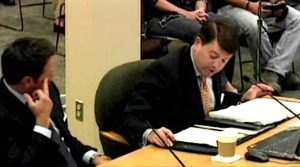 Prior to considering the collection of proposed “no camping” ordinances currently on their table, members of the Pensacola City Council were provided with a presentation from the EscaRosa Coalition on the Homeless. City Administrator Bill Reynolds said the presentation was meant to educate council’s they considered the ordinances. Councilwoman Sherri Myers would later describe it as an effort to “soften us up to accepting this.”
Prior to considering the collection of proposed “no camping” ordinances currently on their table, members of the Pensacola City Council were provided with a presentation from the EscaRosa Coalition on the Homeless. City Administrator Bill Reynolds said the presentation was meant to educate council’s they considered the ordinances. Councilwoman Sherri Myers would later describe it as an effort to “soften us up to accepting this.”
John Johnson, the homeless coalition’s executive director, said yesterday that the city arranged for the presentation a few weeks ago. He was unaware the proposed ordinances were also on the May 6 agenda.
“I did not know,”ohnson said.
The director also said that the coalition had not been contacted, had not been asked for input, regarding the ordinances.
“It probably would have had a better outcome if not only myself, but other homeless providers, were contacted,”hnson said.
Mayor Ashton Hayward recently put several ordinances on counci’s table that critics claim “criminalize homelessness” approved, the ordinances will prohibit activities such as camping, washing in public restrooms, public defecation and “aggressive solicitation, begging or panhandling.” The administration contends the ordinances are necessary to”promote the aesthetics, sanitation, public health and safety of its citizens.”
“This will definitely impact the homeless population,” Johnson said yesterday, taking a break from the coalition’s annual meeting.
Johnson’s presentation to the city council painted a portrait of a growing homeless population coupled with dwindling resources and scarce services. Particularly alarming were statistics concerning families with children, as well as veterans.
Following Johnson’s presentation, Reynolds described to council “the proactive steps we’re going to start moving forward with.” The administrator explained that the city would be exploring additional funding sources with its federal lobbyist and also collaborating with EscaRosa on “the little outreach piece that they’re working on.”
“That’s something that we’ve never done before, that is a piece that has been missing from what we do,” Reynolds said, explaining that the city would work to “educate” the homeless about available services. “We’re going to facilitate that at the city level – to educate, and try make sure that those we can identify here in the city of Pensacola fully understand what’s available. Because even if someone is not willing to go that day, they may have an opportunity where something goes wrong or they’re not happy at some point in the existence that they’re living and they say, you know, I remember a program. I remember a program that somebody told me about one day when I was under the bridge and I think I want to do something about that at this point.’ So, we’re going to start putting something together in that respect.”
Council President P.C. Wu described this development as “very good news.”
“Because it shows the city taking a proactive approach to solving a very difficult problem,”t he president said.
City Public Information Officer Derek Cosson later explained that the education would take place when a police officer “makes contact with someone regarding a potential violation of one of these ordinances.”
“The officer will educate the individual on available help,” Cosson wrote in an email.
Johnson said that he understands both sides of the debate.
“The homeless can present a problem for local businesses, I do understand that – many folks don’t want to be harassed or asked for money,” the coalition director said. “On the other hand, I do understand it from the perspective of the homeless.”
Johnson said that if the ordinances are passed, it will effectively prohibit homelessness in the city and push the population outside its boundaries.
“If that becomes law, then I’d want the homeless population to abide by the law,” he said. “But then we have to find the solutions.”
To that end, Johnson appeared optimistic about a homeless task force initiated by the city council in light of the proposed ordinances. Councilwoman Jewel Cannada-Wynn has tapped the coalition director to sit on that task force.
“I want to work with the council in whatever way I can to find solutions,”Johnson said.
To that end, Johnson appeared optimistic about a homeless task force initiated by the city council in light of the proposed ordinances. Councilwoman Jewel Cannada-Wynn has tapped the coalition director to sit on that task force.
“I want to work with the council in whatever way I can to find solutions,” Johnson said.
Whatever the solutions – the director offers up a ‘tent city’ as an example – they will inevitably involve costs. The same can be said of the ordinances.
“If the ordinances pass, it’s going to cost dollars,” Johnson said, rattling off the math involved with possibly incarcerating homeless people. “Sixty percent have some sort of issue – mental, physical – you factor that in to going to jail, the cost, if it’s exaggerated by these factors, can be substantial.”
Three of the four proposed ordinances are scheduled for a final reading, and probable passage, May 23. Council will begin discussing the fourth “addressing aggressive’ panhandling – during Monday’s Committee of the Whole meeting.
– For more on the city’s proposed ordinances, read this week’s print edition of the Independent News; available at inweekly.net later today, and on the streets tomorrow.



